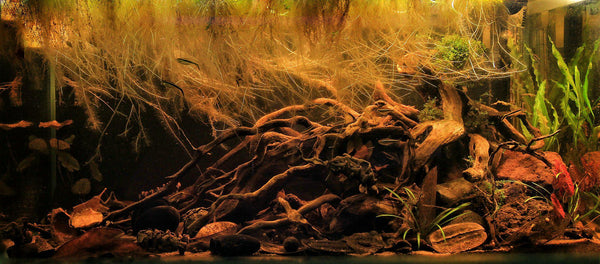- Continue Shopping
- Your Cart is Empty
Evolution. Patience. Time. The first mental shift.
Everything in our aquariums changes over time. How we accept that and embrace it is an important factor in how happy we are with our aquariums.

We talk so much about the idea of "evolution" of our natural-style aquariums that it starts to sound a bit repetitive, I think.

However, the fact of the matter is that an aquarium which utilizes natural materials such as seed pods, leaves, and other botanicals for the bulk of it's "hardscape" will go through a period of time where it's sort of, well- "meh."
I hear this all the time.
It goes something like this:
The aquarium starts with a nice idea to utilize some cool seed pods and such, which, of course, you execute. And it usually looks fabulous for the first week or so.

And then, things change a bit...
The pristine seed pods and leaves start "softening" a bit. And what's that stringy stuff accumulating on the edges? Why, it's our old friend/nemesis/resource (depending upon your POV), biofilm.

Yup, the first mental shift that we have to make as lovers of truly natural style aquariums is an understanding that these tanks will not maintain the crisp, printing look without significant intervention on our part. And, by "intervention", I mean scrubbing, rinsing, and replacing the leaves and botanicals as needed. I mean, sure- you can do that. I know a bunch of people who do. They absolutely love super prisitne-looking tanks.
I admit, I feel a bit sorry for these people who can't make the mental shift to accept the fact that Nature does here own thing, and will lay down a "patina" on our botanicals, gradually transforming them into something a bit different than when we started. When we don't accept this process, we sadly get to miss out on Nature guiding our tank towards its ultimate beauty- perhaps better than we even envisioned.
For some, it's really hard to accept this process. To let go of everything they've known before in the hobby. To wait while Nature goes through her growing pains, decomposing, transforming and yeah- evolving our aquascapes from carefully-planned art installations to living, breathing, functioning microcosms.
But, what about all of that decay? That "patina" of biofilm?
It's okay.
It's normal.

It's part of this type of approach. It's present in all natural aquatic systems. We just work with it instead of against it. In stead of trying to sanitize, edit, or otherwise "redirect" Nature, we understand that it will follow its own path, sometimes going through phases that we may not appreciate.
Evolution.
And guess what? It never stops.
And one more thing? The biofilms and that you might loathe so much tend to subside almost completely over time...If you are patient, and don't tear your tank apart in a frantic effort to eradicate one of Nature's finest creations.

The ebb and flow of life in a natural, botanical-style aquarium is much like a garden. You can and should perform regular maintenance, conducting water exchanges, filter media replacement, etc.- like you do in any other tank. However, you need to conduct these maintenance sessions not with the idea of "THIS will take care of those biofilms", but an attitude of. "This will continue to facilitate change over time..."
Yeah, it requires a certain attitude.
And a willingness to look at Nature as she actually is- and to appreciate the beauty in the details of her processes.

A willingness to accept.
An acceptance that Nature will plot the right course for your tank. And, you need a degree of patience and yeah- faith- that things will unfold in ways you may not even have begun to appreciate. Like any other aquatic endeavour, you can make it easier and more enjoyable by being aware of what is going on, and accepting the way Nature works her magic.

It simply takes time.
And patience.
Are you up to it? Can you make the first mental shift?
Spoiler: You've already started. Don't fight it.
Stay strong. Stay diligent. Stay calm. Stay patient. Stay observant. Stay resolute...
And Stay Wet.
Scott Fellman
Tannin Aquatics







Scott Fellman
Author